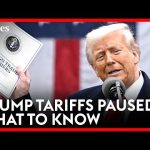President Trump’s decision to pause most tariffs for 90 days sparked a massive stock market rally, with the Dow soaring nearly 5.8% and the Nasdaq jumping 8.5%. Conservatives praised the move as a strategic win, highlighting Trump’s flexibility in trade negotiations while holding firm against China. Heritage Foundation expert Rich Stern called it proof that “Liberation Day is playing out as it should,” signaling a shift toward fairer global trade.
The president’s 90-day pause on reciprocal tariffs—except for China—reassured investors fearing a prolonged trade war. Stocks roared back from a 17% decline, with Walmart and Delta adjusting strategies to navigate the new landscape. Conservatives argue this proves Trump’s policies prioritize American growth while pressuring adversaries.
Trump slapped a 125% tariff on Chinese goods, citing Beijing’s “lack of respect” for global markets. China retaliated by raising its tariffs to 84%, but conservatives applaud Trump’s toughness. They see this as a necessary stand against unfair trade practices that have long harmed U.S. industries.
Companies like Walmart maintained sales forecasts despite tariff pressures, showcasing American adaptability. Delta, however, warned of slowed growth due to travel sector uncertainty. Conservatives emphasize that Trump’s policies force nations to negotiate fairly, ultimately benefiting U.S. workers and businesses.
Rich Stern’s “Liberation Day” framing aligns with the conservative view that Trump’s tariffs free America from exploitative trade deals. By pausing rates for cooperative nations, Trump rewards allies while isolating China—a strategy conservatives argue restores U.S. economic sovereignty.
The 90-day window allows negotiations, but conservatives stress that strength, not concessions, drives results. Trump’s mix of flexibility and firmness mirrors his border security rhetoric, proving he’s willing to adapt tactics without abandoning core principles.
Despite backlash from left-leaning outlets, conservatives highlight the market’s vote of confidence. They argue Trump’s approach—unlike past administrations—puts America first, even if it means short-term volatility for long-term gains.
With corporate earnings season underway, conservatives urge businesses to align with Trump’s vision. The president’s tariff strategy, they say, isn’t about isolation—it’s about forging deals that respect American workers and ignite lasting prosperity.




